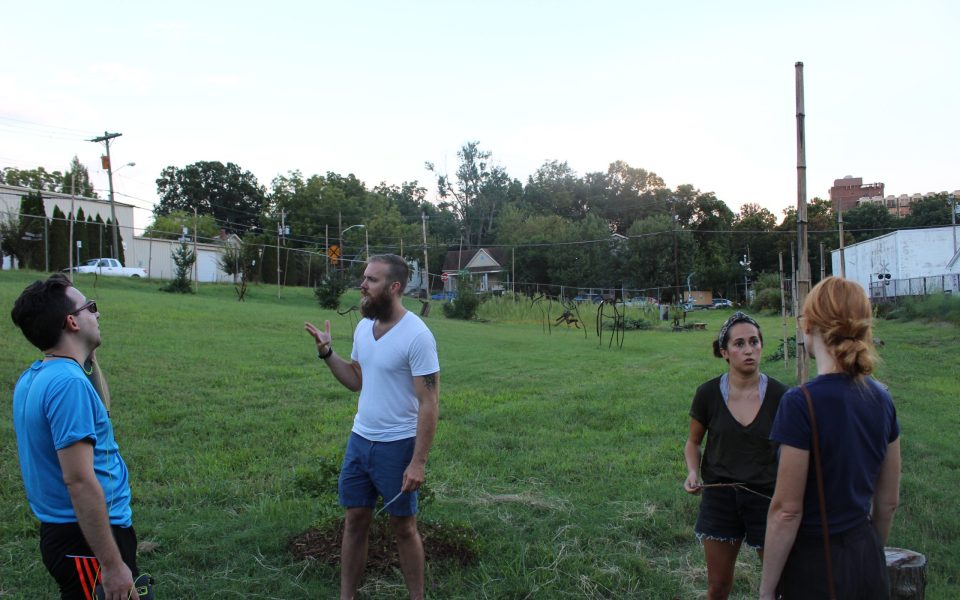A new team running Black Diamond, originally envisioned as an urban orchard flanking downtown Greensboro, is calling the space “a public backyard” and inviting neighborhood input on how to transform the sizable green space.
When David Myers signed a lease to take over and transform a fallow plot of land owned by Guilford County Schools near downtown Greensboro more than two years ago, he had grand visions for the lot. Black Diamond Food Forest would be an urban orchard and educational space, he said at the time.
Myers dramatically remade the plot that sits between the Cedar Street and Westerwood neighborhoods, planting dozens of donated fruit trees, working the soil and growing sunflowers to pull some of the toxins out of the ground. But the help he sought for with the project never really arrived, at least not with consistency, and Myers found himself consumed by weeding, mowing, picking up trash and dealing with general maintenance of the site.
Myers, who was 35 when he launched Black Diamond, signed a 10-year lease with Guilford County Schools for the unused space about two and a half years ago, though the school system can easily pull back from the agreement and reclaim the land along Prescott Street and Guilford Avenue.
A dead railroad track runs along the site’s western side — it will eventually become part of the Downtown Greenway — right by Westerwood Tavern and Greensboro College’s theater building, between a more transient, small neighborhood with affordable housing to the east and the artsy and leafy Westerwood neighborhood with higher home ownership rates. The school system hosts its technology center in a building directly north, between Black Diamond and the relatively new greenway cornerstone gazebo and garden, but the rectangular grassy site had been unused for almost a decade.
[pullquote]Visit blackdiamondgso.com for more info. [/pullquote] Despite Myers’ progress, he’d hit a point where he was basically treading water, trying to keep Black Diamond together on his own while falling short of the stated educational goals. The gate to the site remained locked most days, and while neighbors said they appreciated the upgraded view, that’s about as far as the benefits extended.
Enter three recent college graduates, similarly wide-eyed and inspired.

Gray Johnston, a Greensboro native, Thaís Weiss and Molly Fisher attended UNC Chapel Hill together, and when they finished, decided to move to Greensboro particularly because of the opportunity Black Diamond presented.
Last week, Myers and the younger trio hosted an open house of sorts on the land, sharing snacks and tea under a white tent and walking through the space with neighbors and other city residents drawn by the potential environmental and farming angles to the land. Though informal and relatively small, it’s their first public event aimed at drawing people into the space and inviting neighbors to define its use together.
Some changes will be definite; they’re calling Black Diamond a “public backyard” now, and they remade the website to reflect the shift. Originally Johnston, Weiss and Fisher discussed dreams of community gardens with plots run by the Cedar Street area residents and a few others nearby. And that may still happen depending on interest, and whether two Guilford College students who showed up at the open house — who work at the school’s fully functioning farm — help construct garden beds as they plan. Johnston said the Black Diamond crew want to set up more shaded areas and provide some seating, and they hope to host events that bring people into the space, such as outdoor film screenings.

©
“A lot of the inspiration for what we want to do comes from tactical urbanism,” Johnston said at the open house last week. He looked over the fruiting apple trees and gentle hill of Black Diamond with the city’s bicycle and pedestrian coordinator Daniel Amstutz, who lives nearby and stopped in to check out the area.
Other nearby residents trickled in too, including Kenzi Watts and her kids, traipsing between trees, admiring several pieces of sculptural art that adorn empty spaces and a small apiary in the back corner. Nick Mangili, the farm manager at Guilford College, helped Myers grow some hops along one side, Johnston said, adding that they’re open to myriad other ideas and potential uses for the space that fall along the spectrum of environmental sustainability and urban placemaking.
For Weiss, the activation of Black Diamond as a public space is a way to create community. She’s seen the way public space can bring people together elsewhere, she said, and the opportunity to be a part of building that from the ground up was enough to draw her to Greensboro. She hopes Black Diamond can help people — their team included — reconnect to the environment, but Weiss added that they’re intentionally going slowly in order to allow for neighborhood input in shaping what Black Diamond will become. 
Join the First Amendment Society, a membership that goes directly to funding TCB‘s newsroom.
We believe that reporting can save the world.
The TCB First Amendment Society recognizes the vital role of a free, unfettered press with a bundling of local experiences designed to build community, and unique engagements with our newsroom that will help you understand, and shape, local journalism’s critical role in uplifting the people in our cities.
All revenue goes directly into the newsroom as reporters’ salaries and freelance commissions.


Leave a Reply